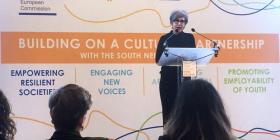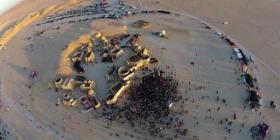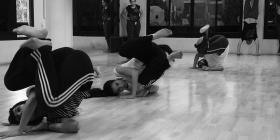CULTURE, THE WAY FORWARD IN THE MEDITERRANEAN
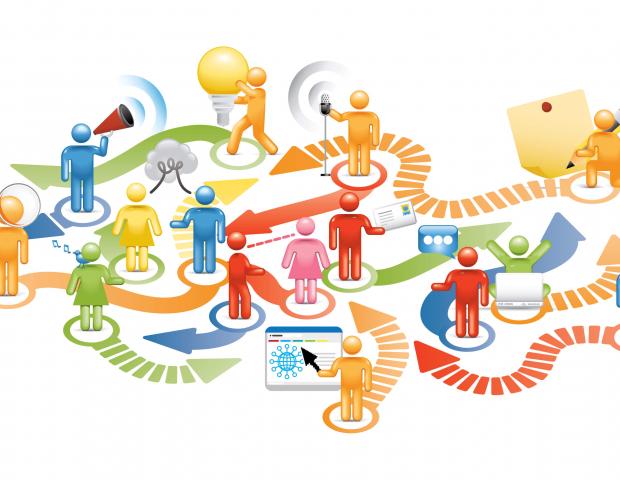
“WE NEED ALTERNATIVE NARRATIVES”
‘At this stage of our life, when we are bombarded with negative forces, extremism and radicalism, we need art and culture more than ever to reach communities, especially the young, with alternative narratives,’ said Lina Attal, Director of Jordan’s National Centre for Culture and Arts, as a group of vibrant young men and women were singing to the tunes of a gifted guitarist at the ground of the Landmark hotel in Amman.
This spontaneous act celebrated the end of a gruelling, yet inspiring forum which was organised in the framework of Med Culture, a European regional programme.
‘Networking; exchanges; learning; action; sharing experiences; collaborations; advocacy; addressing policies,’ those were the aspirations artists, performers, dancers, musicians, writers, architects, activists from various social and religious backgrounds voiced out following this two days forum. This deeply rooted bond between youth was transmitting a message of resilience, celebration of life and defiance at a time when human values, tolerance and co-existence are at risk.
The soft power of culture can rival any political, economic or defence power, but this rich and untapped historic resource requires proper tools to thrive and make an impact. EU officials believe culture could be the conduit to tackle ripple effects of unrest and disenchantment that are often compounded with poverty and unemployment, such as radicalism and marginalisation. Irene Mingasson, a high representative of the European Union Neighbourhood South programme from Brussels confirms that ‘culture is the vector to create pluralism, coexistence and respect within societies and between north and south shores of the Mediterranean, and at last, the importance of culture has been acknowledged as well as the role of civil society to build stronger and more resilient societies.’ The European Union external relations is pledging continued support for culture in order to empower existing institutions, improve capacity of stakeholders and ultimately reach a ‘strong degree of appropriation and ownership of such cultural programmes on a regional scale’
This programme has created a spark of hope for change, an alternative cultural narrative that can grow further in the Mediterranean region. But with hope comes also fear. ‘I really do not want it to be a programme that starts, ends and disappears and the impact disappear with it. I have seen so many projects end. It would be pity to see all this investment go to waste,’ stated Dima Shahin, one of the programme’s beneficiary. Shahin, an artist and film maker stressed on the importance of continuity when it comes to cultural projects.
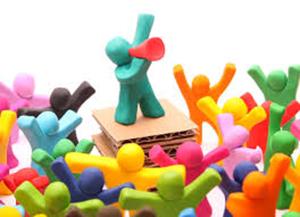
“IT’S ABOUT EMPOWERED YOUNG PEOPLE
Since 2014, the Med Culture EU programme has offered support to a wide array of artists and activists from the South Mediterranean region to develop their capacities, build a solid network with cultural operators and learn best practices from each other through a plethora of projects that employed innovative methods.
Identifying the most relevant challenging issues and recommendations to tackle them were at the centre of activities in the Med Culture Forum, based on peer to peer exchanges and interactive workshops which included games, visual arts, performances and group discussions. This two-day event witnessed a wide range of activities; from open dialogue with experts to group sessions that deployed a unique approach to maximize output of each and every individual of the 120 participants.
‘There is a big focus on participatory dynamics, the people themselves, how they can learn from each other, and focus on the learning issues and how learning is part of the work. It is about group dynamics. How you manage the group, how you make sure all the people in the room actively participate,’ said Fanny Bouquerel, the Capacity Development expert of the Med Culture programme.
Organisers try to make sure everybody in the room has the right to participate, and contribute, thus setting up foundation for strong networking amongst the participants. Participants are divided into several working groups, which are facilitated by young professionals who have also benefited from the programme’s Training of Trainers.
Workshops are designed to address vital issues such as resilience and culture, combating radicalisation through dialogue, youth integration and employability and promotion of social cohesion, as well as awareness raising. Each group works together to identify challenges and solutions, before a final vote within each group takes place to select most significant recommendations.
‘The themes are important because culture is not just about dance, arts, music, etc. If we talk about development, we talk about development of culture, promoting resilient society, empowered young people. We can do it all through culture. We can also address employability through culture. Therefore, culture is a cross cutting theme, it involves many sectors…’ advocates Christiane Dabdoub Nasser, Med Culture EU programme’s Team Leader.
To promote resilience in societies, participants pointed to the importance of instilling culture of resilience in curriculums in order to breed a new generation free from current shackles of the society. As for the promotion of youth employability, participants pointed to the gap between civil society and the public sector as an issue that needs to be addressed by policy makers. Participants of this forum also identified lack of information for professional opportunities as well as seasonal and unsustainable job opportunities in cultural sector as obstacles to creating and hence finding jobs.
‘We need documentation of cultural activities, conferences and research papers in order to have access to such important source of learning. It is important to build on our previous gains and efforts that have been exerted in developing the cultural scene,’ said Adel Abdel Wahab, theatre Director at Hewar from Egypt and one of the beneficiaries of the EU programme.
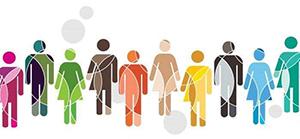
“WE SHOULD FOCUS ON WHAT BRINGS PEOPLE TOGETHER
‘The idea of the programme is great because it helps establish cooperation between various stakeholders in culture, be it official bodies or independent organisations, therefore, we need to become complementary to each other in order to stimulate growth of the cultural scene and make it sustainable’, continued Adel Abdel Wahab.
When discussing the initiative to build a community of practice, participants said that major challenges include mobility and the promotion of existing expertise. They called for setting up specialised trainings that can address needs assessment provision, evaluation for seasoned trainers and setting up cultural incubators to foster entrepreneurships.
‘We should focus on what brings people together, rather than what sets them apart’ stressed the programme’s Team Leader.
This is why the Med Culture programme funded a total of 63 small projects through two main grants projects, Drama, Diversity, Development (DDD) and SouthMed CV. The former aimed to build a regional cohort of experienced professionals with the capacity to link minority rights, cultural rights and drama and communicate minority identity through drama; and the latter aimed to bring culture from the margins to the centre of the public sphere, connecting it with economic, social and political development, while strengthening capacities of civil society organisations and youth.
These projects reflected a high level of creativity and provoked debate on issues often brushed under the carpet; including violence against women, racism against minorities and refugees.
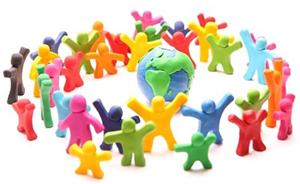
“BUILD A COMMUNITY ABLE TO CO-CREATE NEW AND ALTERNATIVE SOLUTIONS
Raya Ben Guiza, culture activists from Tunisia took to the podium at the final session of the meeting to sum up her experience throughout the forum, presenting her reflections and conclusions on the intense discussions that took place during these two days and the expectations for the future of the culture sector in the region, highlighting how common are the challenges facing culture in Algeria, Morocco, Egypt, Palestine, Lebanon, Jordan and Tunisia. Guiza concluded that ‘the specificity and diversity of this human capital has contributed, with and within the framework of Med Culture, to build a community able to co-create new and alternative solutions to ensure the survival of its culture ecosystem.’
‘It is therefore necessary for the Med Culture programme to consolidate its achievements and gain momentum, to keep its own objectives, objectives that respond to the culture sector’s thirst in the Med region’ confirmed Diego Marani, a senior advisor on cultural policy at the European Union.
EU officials have assured participants that the programme that will follow Med Culture, which should be completed within a year, would be based on the achievements, conclusions and recommendations presented by the participants. They called on grants’ beneficiaries to continue working together to foster regional cooperation, a missing component in the cultural milieu.
United by their rich cultures, the 120 aspiring cultural activists followed in a circle, hand in hand, shoulder to shoulder, the beat of the Dabke folkloric dance. As the music faded out, each young man and woman rolled out their sleeves and embarked on cultivating the knowledge and network they built to realise their aspiration as they wait for the next chapter to write itself.





